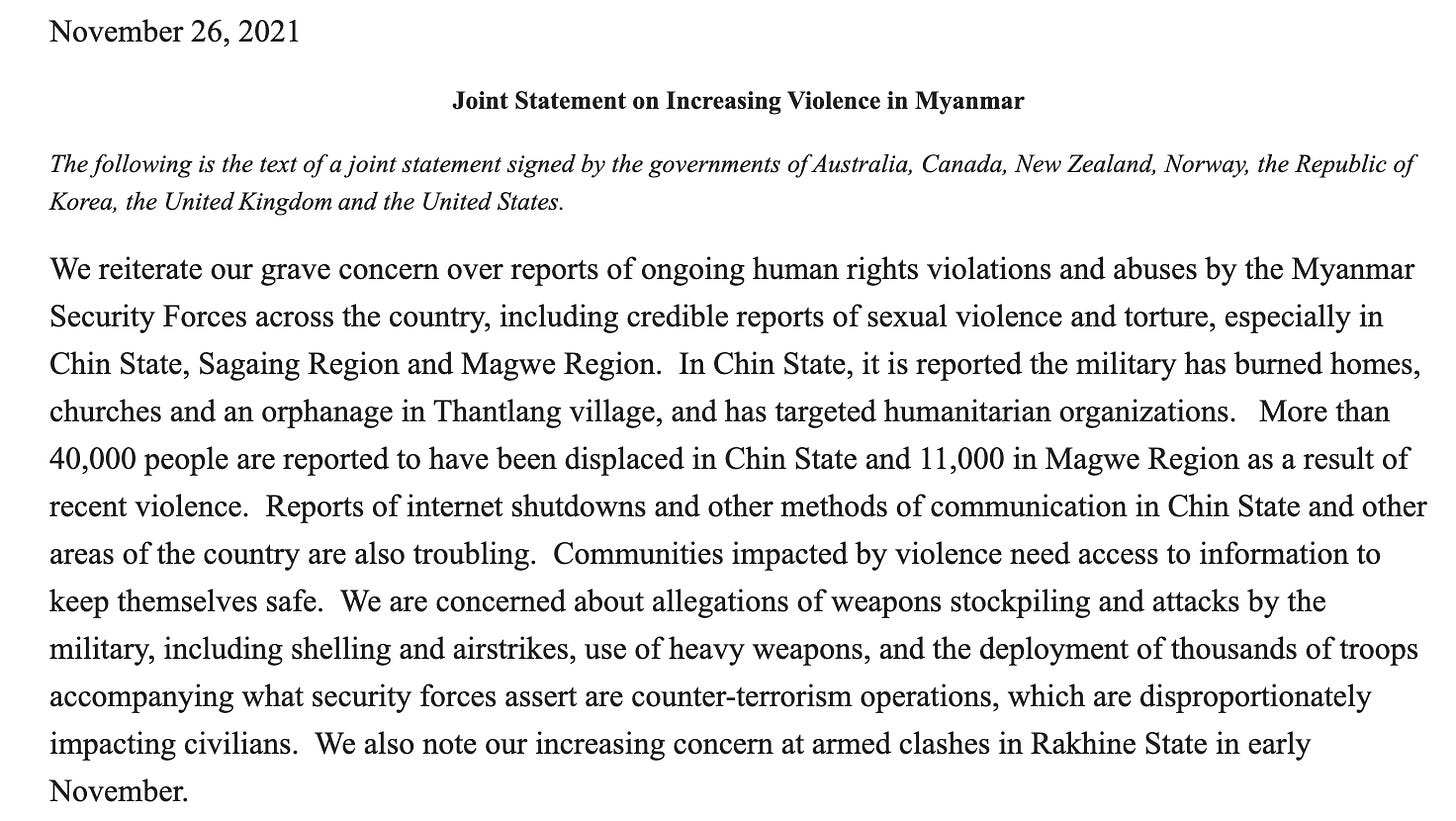Migrants in Calais are dying to leave.
The Calais 'jungle,' a makeshift encampment housing thousands of migrants trying to make the journey from Northern France to the United Kingdom, sprang up around five years ago, at the height of Europe's migrant crisis. And although authorities have attempted to crack down on smuggling groups and dislodge the encampment, migrants have continued to flock to the city unabated ever since.
At least 27 people died this week, making a desperate attempt to leave the port city and cross the English Channel.
This week, I had a quick chat with Abdul Saboor, an Afghan photojournalist based in Calais, about his journey to the city and why people want to leave it.
But first, please send story tips or recommendations to c.maza@protonmail.com. And don't forget 👇👇
Upgrade to a premium subscription by Clicking Here.
Cristina: Where are you from originally, and how long have you been in Calais?
Abdul: I'm from Afghanistan. I've been in Calais now for about three and a half years. I left Afghanistan because life was hard. I worked with the U.S. Army, and I was shot and injured a few times. Then the U.S. left the city where I was working. They all went home, and I was left on the ground there, so I decided it was time to leave.
Cristina: How did you travel to France from Afghanistan?
Abdul: Walking. I crossed borders on foot. It took me two years. I stayed in forests, mountains, refugee camps, 'jungles,' anywhere I could find. I passed through Pakistan, Iran, Turkey, Bulgaria, Serbia, Croatia, Hungry, Slovenia, and Italy. After that, I traveled to France and then Belgium, and Spain. Eventually, I went back to France, and I have been here ever since. It was a very long, long trip.
Cristina: How did you support yourself during that time?
Abdul: When I was traveling, I did a little bit of photography. My family sent me a little bit of money for food. Now I teach photography in a university one day a week, and I sell my photos.
Cristina: I know that there has been a recent uptick in the number of people trying to cross from Calais to the United Kingdom. Why is that happening now?
Abdul: Because the weather is bad. The camps are like hell. They are cold, windy, rainy. They are so cold. People are finding the camps very difficult. They don't have enough to eat. A lot of people made a quick decision to leave. Many people go with traffickers. Some people try to go alone, but some go with traffickers. It's because they are in the camps and they think, 'what else can I do?'
Cristina: How much do the traffickers charge for their services?
Abdul: Different people charge different amounts. Some people charge €3,000, some € 2,000, or some people say € 5,000.
Cristina: How many people do you estimate are in the camps now?
Abdul: I think there are maybe around 2,000 people. There are a lot of Kurds. There are people from Iraq, Iran, Pakistan, Afghanistan, Sudan, Mali, Eritrea, really everywhere.
Cristina: What is the relationship between the people in the camps and the French authorities?
Abdul: The police are harassing people. Police are trying to evict people. They cut their tents. They give them a very difficult time.
Cristina: Why do people want to go to the U.K. instead of staying in France?
Abdul: Most people going to the U.K. tried another European country first. I don't want to go to the U.K. because I have asylum in France. They didn't get asylum, so they decided to go to the U.K once they were rejected.
You can find out more about Abdul and his work here.
What I'm writing:
It's was a roller-coaster week in the Senate, where Republicans voted to block consideration of the National Defense Authorization Act – an annual defense bill many consider sacrosanct – because Democrats wanted to skip voting on a Republican amendment on the controversial Nord Stream 2 pipeline.
No one in Washington likes the Nord Stream 2 pipeline, but I don't think anyone believed it had the power to delay the NDAA.
Then the argument pivoted to Senator Marco Rubio's amendment on Uyghur forced labor in China's Xinjiang province. Here's some reporting from the last few days:
• The fight over Nord Stream 2 ammendments is really about whether the White House should have the power to waive congressionally-mandated sanctions. And it's not an entirely partisan fight.
• The NDAA stalled in the Senate due to disagreements over Senator Marco Rubio's amendment on Uyghur forced labor. Democrats argue that because revenue-generating legislation has to be passed in the lower chamber first, the House must pass a version of Rubio's bill before being included in the Senate version of the NDAA. On its face, this is a procedural issue. But Republicans say that House Dems are stalling on bringing the bill to the floor due to pressure from the Biden administration, which doesn't want to derail climate negotiations with China. This article is unlocked.
• As the Senate struggles to advance its annual defense policy bill, it’s possible lawmakers will also run out of time to vote on a joint resolution to block a $650 million weapons sale to Saudi Arabia. Members of Congress have just 30 days to vote on a joint resolution following congressional notification. That means they'll need to vote on the resolution almost immediately.
What I'm reading:
• Israel and Morocco imposed bans on all foreign travelers in response to the Omicron variant of Covid-19, the New York Times reports.
• Germany’s new government, led by Olaf Scholz, will be sworn in next week 💥.
• The German government (under Chancellor Merkel) is urging members of Congress not to sanction the Nord Stream 2 pipeline, according to Axios.
• The EU and U.S. took coordinated action to ramp up sanctions on Belarus. The new measures target officials in Alexander Lukashenko's regime, the state-owned airline Belavia, and tour operators and hotels “that have helped incite and organize illegal border crossings through Belarus to the EU,” according to a statement from the European Council.
• The E.U. proposed new measures to extend the period of time that Latvia, Lithuania, and Poland can detain asylum seekers while their applications are processed, the New York Times reports.
• U.S. Secretary of State Antony Blinken and Russian Foreign Minister Sergey Lavrov expressed seemingly irreconcilable positions before and following their meeting on the sidelines of a ministerial meeting of the Organization of Security and Cooperation in Europe (OSCE), Politico Europe reports.
• Tensions between Russia and the West escalated after Russian President Vladimir Putin demanded “legal guarantees” that the NATO alliance would never expand eastward, a position NATO regards as untenable, the New York Times reports.
• Russia has positioned more forces near Ukraine's border and is erecting supply lines such as medical units and fuel that could sustain a drawn-out conflict should Putin move to invade, CNN reports.
• The Kremlin said it could not de-escalate tensions with the West over Ukraine due to a large concentration of Ukrainian forces near its border, Reuters reports. Russia also said it arrested three suspected Ukrainian intelligence agents, including one accused of planning an attack using homemade bombs.
• NATO warned that its members would impose high political and economic costs on Russia if it launches a new military incursion into Ukraine, according to the Wall Street Journal.
• Belarus announced surprise joint military drills with Russia on its southern border with Ukraine, Reuters reports.
• Russia ordered U.S. embassy staff who have been in Moscow for more than three years to leave Russia by January 31 in response to a U.S. decision to limit the length of terms Russian diplomats spend in the U.S., Reuters reports.
• Poland’s Constitutional Tribunal said the European Court of Human Rights had no power to question its appointment of judges, Reuters reports. The Secretary-General of the Council of Europe, Marija Pejčinović Burić, said the Polish judgment “is unprecedented and raises serious concerns."
• Poland's president also signed into law legislation to limit the access of aid groups and journalists to the border with Belarus, Reuters reports.
• Nicolae Ciucă is now Romania’s Prime Minister and has united former rivals the National Liberal Party and the Social Democratic Party, Balkan Insight reports.
• North Macedonia’s governing Social Democratic Union of Macedonia party will choose a new leader on December 12, and that person will take over as Prime Minister, Euractive reports.
• Greece has opened two new migrant centers on the islands of Kos and Leros, according to local media reports.
• Milorad Dodik, the Bosnian Serb leader accused of pursuing the breakup of Bosnia-Herzegovina, said the threat of Western sanctions would not deter him and hinted that China and Russia would come to his assistance, the Guardian reports.
• Turkey’s President Recep Tayyip Erdoğ announced a loyalist as the country's new finance minister after the incumbent resigned due to disagreements with Erdogan’s unconventional economic policies that have intensified a currency crisis, the Wall Street Journal reports.
• French police are struggling to deal with people trafficking networks sending people to Calais as migrants drown trying to make their way to the U.K., Politico Europe reports. Meanwhile, British MPs have warned against proposals to push back small boats in the Channel.
• The Guardian has the names and stories of 10 people who died in the English Channel, including a mother and her three children.
• The Biden administration reached a deal with the Mexican government to restart the “Remain in Mexico” program, which initially started during former President Donald Trump’s administration, the Washington Post reports.
• Honduras held a presidential election that pitted a corrupt ruling party candidate against Xiomara Castro de Zelaya, the wife of a left-wing former president who was deposed by the military, the Wall Street Journal reports.
• Israeli settler attacks on Palestinians in the occupied West Bank increased dramatically in recent months. Violent incidents against Palestinians have been up nearly 150% in the past two years, the Washington Post reports.
• Saudi Arabia used “incentives and threats” to shut down a United Nations investigation into human rights violations committed in the Yemen conflict, the Guardian reports.
• At least 20 Sudanese troops died following clashes with Ethiopian forces on the border between the two countries, Bloomberg reports.
• The Ugandan military launched air and artillery raids against the Allied Democratic Forces (ADF), an armed group in the eastern Democratic Republic of the Congo (DRC), in an operation agreed to by Congolese forces, Al Jazeera reports. Uganda also deployed foot soldiers inside Congolese territory, intensifying a military assault against the Islamic State-linked ADF, the Associated Press reports.
• This is an astonishing piece from the Wall Street Journal: Undercover Taliban agents spent years infiltrating Afghan government ministries, universities, businesses, and aid organizations. Then, as U.S. forces were completing their withdrawal, they stepped out of the shadows and helped the Taliban seize control from the inside.
• More than 100 former members of the Afghan security forces have been killed or disappeared by the Taliban in the first two and a half months of the Taliban’s rule, according to a new report by Human Rights Watch.
• Security officials in China’s Henan province commissioned a surveillance system to track journalists and international students among other “suspicious people," Reuters reports.
• The Pentagon will focus on building bases in Guam and Australia to better prepare the U.S. military to counter China, CNN reports.
• Australia adopted Magnitsky-style rules to facilitate sanctions against individuals accused of human rights abuses, the Wall Street Journal reports.
What the State Department says:
Upgrade to a premium subscription by Clicking Here.
You can also contact me for any reason by writing to c.maza@protonmail.com.










